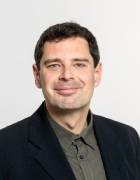
Prof. Dr. Andreas Wiese
Academic Career and Research Areas
Andreas Wiese works on combinatorial optimization problems. These are problems in which the best or a very good solution needs to be found among very many possible solutions, as quickly as possible with the help of a computer. The goal is to program the computer with a so-called algorithm in such a way that it finds the desired solution very fast. For example, if you use your smartphone to find the best way to some destination, then such an algoritihm is used, and it typically finds the best way for you in less than a second.
Andreas Wiese studied mathematics at the TU Berlin where he also did his PhD in mathematics. He was a postdoc at the "La Sapienza" University in Rome and at the MPI for Informatics in Saarbrücken. He has also been a professor at the Universidad de Chile in Santiago and at the Vrije Universiteit Amsterdam. Finally, Andreas Wiese joined TUM in 2022.
Key Publications (all publications)
Fabrizio Grandoni, Tobias Mömke, and Andreas Wiese: "A PTAS for the Unsplittable Flow on a Path problem. " 54th Annual ACM Symposium on Theory of Computing (STOC 2022). Rome, 2022.
AbstractLars Rohwedder, Andreas Wiese: “A (2 + ε)-approximation algorithm for preemptive weighted flow time on a single machine.” 53rd Annual ACM Symposium on Theory of Computing (STOC 2021). Online, 2021: 1042-1055.
AbstractAnna Adamaszek, Sariel Har-Peled, Andreas Wiese: “Approximation Schemes for Independent Set and Sparse Subsets of Polygons.” Journal of the ACM 66(4): 29:1-29:40 (2019).
AbstractWaldo Gálvez, Fabrizio Grandoni, Sandy Heydrich, Salvatore Ingala, Arindam Khan, Andreas Wiese: “Approximating Geometric Knapsack via L-Packings.” 58th Annual IEEE Symposium on Foundations of Computer Science (FOCS 2017). Berkeley, 2017: 260-271.
AbstractFabrizio Grandoni, Tobias Mömke, Andreas Wiese, Hang Zhou: “A (5/3 + ε)-approximation for unsplittable flow on a path: placing small tasks into boxes.” 50th Annual ACM Symposium on the Theory of Computing (STOC 2018). Los Angeles, 2018.
AbstractIf you wish your profile to be changed or updated please contact Franz Langer.